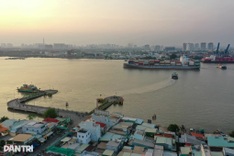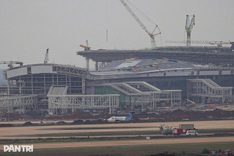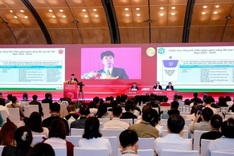The Asian Development Bank (ADB) announced promising figures for Vietnam’s economy in the remainder of 2010 and into 2011.
 |
| Vietnam has consolidated its macroeconomic stability since early this year |
According to Ayumi Konishi, ADB Country Director for Vietnam, the nation has consolidated its macroeconomic stability since early this year and is looking to enjoy a 6.7% growth in 2010 and 7% in 2011 while inflation is declining.
At their launching of the Asian Development Outlook Update 2010 publication which provides their assessment of recent economic developments in Asia and the Pacific and medium-term macroeconomic projections for the region, the ADB also updates information on the outlook of Vietnam’s economy.
According to their assessment, steps taken by the government to stabilized the economy have contributed to an improvement in the economic growth: GDP increased by 6.2% in the first half of 2010, compared with 3.9% in the same period last year.
Industry expanded by 6.5% in the first half of 2010 (contributing 2.6 percentage points of total GDP growth) while services grew by 7.1% (contributing 2.9 percentage points of the GDP growth).
The outlook also points out that the government’s policy of tightening prices and the good rice harvest has contributed to pulling back inflation from 9.5% in March to 8.2% in July and August 2010. Meanwhile, trade deficit narrowed to an estimated 2.7 billion in the first half (5.6% of GDP) from $8.0 billion in July-December 2009.
Forecasting the prospects for Vietnam’s future economy, the outlook assumes that the government will maintain its macroeconomic stability during the forecast period, so that the balance of payments gradually improves and the fiscal deficit narrows. It is assumed that the authorities target growth in credit will be 25% and efforts will be maintained to safeguard and enhance banking system soundness.
“Vietnam is benefiting substantially from the rebound in world trade, which is projected to continue through 2011 at nearly the same pace as this year,” the publication estimates. “The economic expansion rate is expected to pick up slightly in 2011, to about 7%, as investor confidence improves in tandem with more subdued inflation and a more robust external position.”
In addition to that, inflation is projected to average 8.5% in 2010, easing to 7.5% next year on the assumption that domestic macroeconomic stability is maintained and that global oil and commodity prices are relatively steady in 2011.
On the other hand, ADB foresees the risks to the local economy which will centre on any premature easing of monetary or fiscal policies, or a perception of looser policy by financial markets and domestic investors.
“An early easing, or the perception of a relaxation, could derail the macroeconomic stabilization efforts, putting inflation on an upward trajectory and pressure on external accounts,” it warns.
Their suggestion is that the authorities maintain a firm and consistent policy stance, and communicate such a position effectively to the market until inflation is clearly on a downward track and foreign reserves increase. The other major challenge is to raise the efficiency of the economy and reduce supply-side constraints through structural reforms.
“As Vietnam is preparing a new 10-year Strategy and a new 5-year Socio-Economic Development Plan as a new “middle income country”, it will be critical for Vietnam to keep an eye on the global economic scene,” Ayumi said, adding that ensuring the social inclusiveness and the environmental sustainability of the growth are also the key challenges for the country while increasing the economy’s efficiency.




















